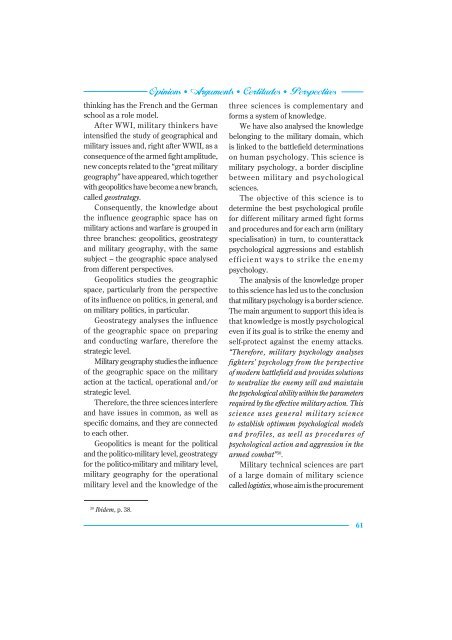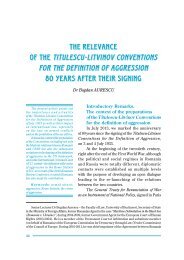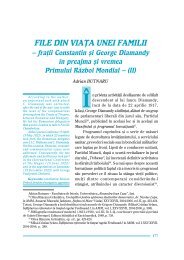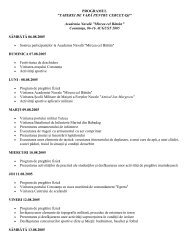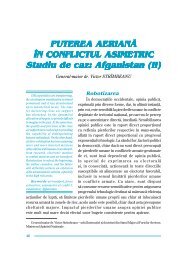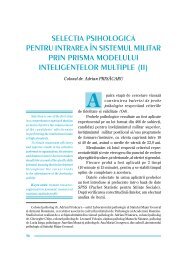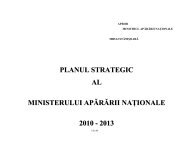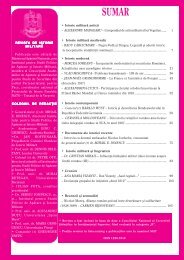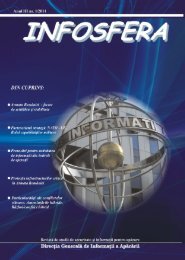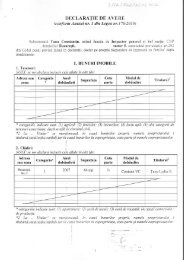Romanian Military Thinking
Romanian Military Thinking
Romanian Military Thinking
You also want an ePaper? Increase the reach of your titles
YUMPU automatically turns print PDFs into web optimized ePapers that Google loves.
Opinions • Arguments • Certitudes • Perspectives<br />
thinking has the French and the German<br />
school as a role model.<br />
After WWI, military thinkers have<br />
intensified the study of geographical and<br />
military issues and, right after WWII, as a<br />
consequence of the armed fight amplitude,<br />
new concepts related to the “great military<br />
geography” have appeared, which together<br />
with geopolitics have become a new branch,<br />
called geostrategy.<br />
Consequently, the knowledge about<br />
the influence geographic space has on<br />
military actions and warfare is grouped in<br />
three branches: geopolitics, geostrategy<br />
and military geography, with the same<br />
subject – the geographic space analysed<br />
from different perspectives.<br />
Geopolitics studies the geographic<br />
space, particularly from the perspective<br />
of its influence on politics, in general, and<br />
on military politics, in particular.<br />
Geostrategy analyses the influence<br />
of the geographic space on preparing<br />
and conducting warfare, therefore the<br />
strategic level.<br />
<strong>Military</strong> geography studies the influence<br />
of the geographic space on the military<br />
action at the tactical, operational and/or<br />
strategic level.<br />
Therefore, the three sciences interfere<br />
and have issues in common, as well as<br />
specific domains, and they are connected<br />
to each other.<br />
Geopolitics is meant for the political<br />
and the politico-military level, geostrategy<br />
for the politico-military and military level,<br />
military geography for the operational<br />
military level and the knowledge of the<br />
30 Ibidem, p. 38.<br />
three sciences is complementary and<br />
forms a system of knowledge.<br />
We have also analysed the knowledge<br />
belonging to the military domain, which<br />
is linked to the battlefield determinations<br />
on human psychology. This science is<br />
military psychology, a border discipline<br />
between military and psychological<br />
sciences.<br />
The objective of this science is to<br />
determine the best psychological profile<br />
for different military armed fight forms<br />
and procedures and for each arm (military<br />
specialisation) in turn, to counterattack<br />
psychological aggressions and establish<br />
efficient ways to strike the enemy<br />
psychology.<br />
The analysis of the knowledge proper<br />
to this science has led us to the conclusion<br />
that military psychology is a border science.<br />
The main argument to support this idea is<br />
that knowledge is mostly psychological<br />
even if its goal is to strike the enemy and<br />
self-protect against the enemy attacks.<br />
“Therefore, military psychology analyses<br />
fighters’ psychology from the perspective<br />
of modern battlefield and provides solutions<br />
to neutralize the enemy will and maintain<br />
the psychological ability within the parameters<br />
required by the effective military action. This<br />
science uses general military science<br />
to establish optimum psychological models<br />
and profiles, as well as procedures of<br />
psychological action and aggression in the<br />
armed combat” 30 .<br />
<strong>Military</strong> technical sciences are part<br />
of a large domain of military science<br />
called logistics, whose aim is the procurement<br />
61


